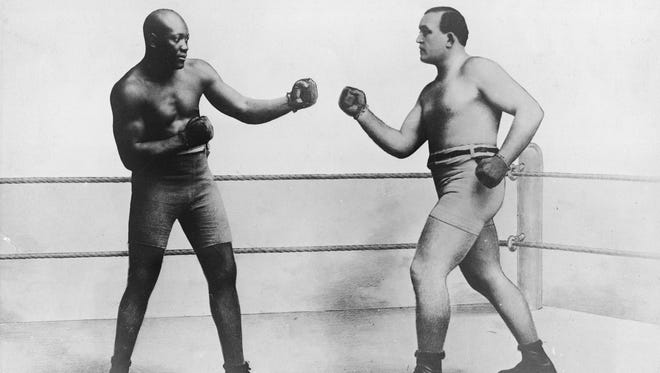Johnson, byname of John Arthur Johnson, is considered by many to be one of the greatest heavyweights of all time. He was among the first generation to be free from the chains of slavery and used this opportunity to become the first African American world heavyweight boxing champion at the height of the Jim Crow Era.
Johnson oozed confidence. Before the match, he would laugh at his opponents. It would make him feel more comfortable and his opponents downright unpleasant. He was also known for being a ladies' man. If his opponents' girlfriends were by the ring, he would often flirt with them. Johnson wasn't always this strong, though.
He was born in Galveston, Texas, and was the first son of emancipated plantation slaves Henry and Tina Johnson. Unlike what many would think, he was a frail young adult. At 16, he ran away from home and headed to New York, where he found employment in a gym and saved up enough money to buy a pair of boxing gloves, sparring every chance he got.
Johnson made his debut as a professional boxer on November 1, 1898, and knocked out his first opponent Charley Brooks. Three years into his career, he fought a white, experienced heavyweight named Joe Choynski. Because prizefighting was illegal at the time, he and Choynski were arrested. The bail was set at $5,000, which neither could afford, so the sheriff agreed to let them go at a lower price if they sparred in the cell. They were incarcerated for a little over three weeks, and when released, both would remain friends. Johnson even claimed that much of his success came from the coaching he received from Choynski, who taught him the nuances of defense that shaped Johnson's boxing style.
Seven years later, Johnson finally won the world heavyweight title. His opponent, Canadian Tommy Burns had taunted him in the press and only agreed to fight Johnson after his promoter guaranteed him $30,000 (about $839,100 today).
 | |
| Johnson faces off against Burns at the 1908 World Heavyweight Championship. Many views testify that the cocky Burns was outclassed from the opening bell. |
Johnson's victory over Burns spurred on the "Great White Hope," a white animosity toward Johnson and the desire for a white opponent to take the title away from him . Even the New York Times wrote that "If the black man wins, thousands and thousands of his ignorant brothers will misinterpret his victory as justifying claims to much more than mere physical equality with their white neighbors." The "Great White Hope" the whites desired came in the form of former undefeated heavyweight champion James J. Jeffries, who had the sole purpose of proving that white males would always be physiologically superior to black males. Their match was considered the "Fight of the Century."
 |
| Johnson faces James J. Jeffries in the ring before the start of the 1910 World Heavyweight Championship. |
Johnson decisively won the "Fight of the Century," and the humbled Burns could do nothing but accept the loss. Many whites felt humiliated, and their anger translated into into race riots across America in which at least twenty were killed and hundreds were injured.
In 1915, Johnson lost his title to Jess Willard, a working cowboy from Kansas. Even so, Johnson fought professionally until he was 60, but eight years later, he died in an automobile accident. Johnson's legacy lives on today, as he is still a pioneer who gives hope to millions of colored boxers everywhere to pursue their heavyweight dreams.
Sources:
https://www.biography.com/athlete/jack-johnson
https://www.usatoday.com/story/sports/boxing/2018/05/24/jack-johnson-boxer-pardon-facts/641737002/
https://www.npr.org/sections/thetwo-way/2018/05/24/614114966/legendary-boxer-jack-johnson-gets-pardon-105-years-after-baseless-conviction
https://evolve-mma.com/blog/5-things-you-need-to-know-about-uppercuts-in-boxing/
https://www.theguardian.com/sport/blog/2010/jul/04/jack-johnson-pioneer-black-boxer
I really like the topic you chose of for your post. I never really thought much about heavy weight fighting in these periods of history. Learning about the beginning of Jack Johnson's career as a heavy weight fighter was very intriguing as had previously been a slave with little to know opportunities. Johnson utilized his emancipation to the fullest as he became a successful heavy weight boxer, taking out many difficult opponents. It would be interesting to learn more about the loss that Johnson had with Willard so I decided to do some research. It turns out that Johnson claimed the fight was not legitimate because Willard was someone who was seen as far less skilled then Johnson. The fight was fair though and the fight actually remains one of the biggest upsets in sports history.
ReplyDeletehttps://www.thefightcity.com/april-5-1915-johnson-vs-willard-upset-victory-jack-johnson-jess-willard/
This was a very well written article. Without this article I never would have learned who Jack Johnson is, nor his impact on future African American athletes. I decided to research Johnson's personal life and was surprised to discover he married three times, all of which were to white women. Marrying a white women as an African American during his era was greatly looked down upon by white people, and as a result he was attacked by the press and disliked by many Americans.
ReplyDelete